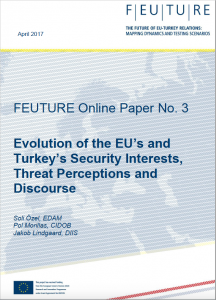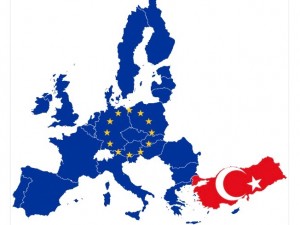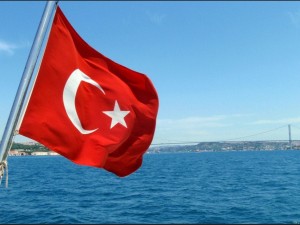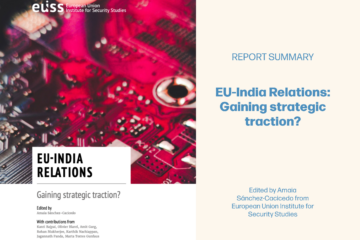Evolution of the EU´s and Turkey´s Security Interests, Threat Perceptions and Discourse
[:en]By Soli Özel (EDAM), Pol Morillas (CIDOB), Jakob Lindgaard (DIIS)
As the relationship between the European Union and Turkey is brought to the spotlight once again, the Danish Institute for International Studies (DIIS) released a paper titled “Evolution of the EU´s and Turkey´s Security Interests, Threat Perceptions and Discourse.” This paper provides a timeline on EU-Turkey relations as well as a debate on whether cooperation or conflict is the likely course of their future. In particular, this paper analyzes the dynamics between Turkey and the EU since World War II, with a specific focus on the Cold War and post-Cold War eras. Furthermore, it explains the reasons for mutual reliance or mistrust, and how this shapes the threat perceptions about each other, which then provide the basis for their decision to cooperate or not in the age of Brexit and the Syrian refugee crisis.
The paper describes this dual relationship as being characterized by “centripetal” and “centrifugal” forces, in other words a push and pull of their incentives to cooperate with each other since WWII. Ever since the 9/11 terrorist attacks in the United States, Turkey has had a pivotal importance given its location and more importantly by the achievement of institutionalizing a form of liberal democracy. On the other hand, Europe´s internal issues such as the Euro crisis, the refugee crisis and Brexit have created a need to find allies (for which Turkey is an ideal candidate). The authors agree that the biggest hurdle between the EU and Turkey is the Turkey´s Kurdish issue and the perceptions of actions taken from both sides.
In addition, the paper discusses the changing nature of NATO and its main players, particularly the insecurity in relation to the American commitment to NATO under the Trump Administration. Specifically, the relationship between the EU and Turkey is likely to be influenced by “Trump´s lack of commitment to liberal principles and dismissive attitude toward the European Union as a democratic project,” which weakens the whole idea behind the security values built after WWII. The EU has growing concerns over the democracy and oppression of freedoms in Turkey, while Turkey self-perceives itself as a “security provider.” Thus, their diverging security perceptions are of concern and need to be addressed by both parties.
After the so called “successful” refugee deal signed by the EU and Turkey in March 2016, there has been increased interest to work together according to this paper although many areas of disagreement still exist. The paper concludes that convergence is an unlikely prospect in the EU-Turkey relations, yet the many shared concerns are ground for cooperation. Among the factors for cooperation are:
- Sending the Syrian refugees back as well as lure of participating in the costly rebuilding of Syria
- Growing jihadi terrorism, as well as cyber security and energy security.
These are the blocs on which the EU and Turkey should build upon for their security and overall relationship in the future.
Read more here:
 [:da]By Soli Özel (EDAM), Pol Morillas (CIDOB), Jakob Lindgaard (DIIS)
[:da]By Soli Özel (EDAM), Pol Morillas (CIDOB), Jakob Lindgaard (DIIS)
As the relationship between the European Union and Turkey is brought to the spotlight once again, the Danish Institute for International Studies (DIIS) released a paper titled “Evolution of the EU´s and Turkey´s Security Interests, Threat Perceptions and Discourse.” This paper provides a timeline on EU-Turkey relations as well as a debate on whether cooperation or conflict is the likely course of their future. In particular, this paper analyzes the dynamics between Turkey and the EU since World War II, with a specific focus on the Cold War and post-Cold War eras. Furthermore, it explains the reasons for mutual reliance or mistrust, and how this shapes the threat perceptions about each other, which then provide the basis for their decision to cooperate or not in the age of Brexit and the Syrian refugee crisis.
The paper describes this dual relationship as being characterized by “centripetal” and “centrifugal” forces, in other words a push and pull of their incentives to cooperate with each other since WWII. Ever since the 9/11 terrorist attacks in the United States, Turkey has had a pivotal importance given its location and more importantly by the achievement of institutionalizing a form of liberal democracy. On the other hand, Europe´s internal issues such as the Euro crisis, the refugee crisis and Brexit have created a need to find allies (for which Turkey is an ideal candidate). The authors agree that the biggest hurdle between the EU and Turkey is the Turkey´s Kurdish issue and the perceptions of actions taken from both sides.
In addition, the paper discusses the changing nature of NATO and its main players, particularly the insecurity in relation to the American commitment to NATO under the Trump Administration. Specifically, the relationship between the EU and Turkey is likely to be influenced by “Trump´s lack of commitment to liberal principles and dismissive attitude toward the European Union as a democratic project,” which weakens the whole idea behind the security values built after WWII. The EU has growing concerns over the democracy and oppression of freedoms in Turkey, while Turkey self-perceives itself as a “security provider.” Thus, their diverging security perceptions are of concern and need to be addressed by both parties.
After the so called “successful” refugee deal signed by the EU and Turkey in March 2016, there has been increased interest to work together according to this paper although many areas of disagreement still exist. The paper concludes that convergence is an unlikely prospect in the EU-Turkey relations, yet the many shared concerns are ground for cooperation. Among the factors for cooperation are:
- Sending the Syrian refugees back as well as lure of participating in the costly rebuilding of Syria
- Growing jihadi terrorism, as well as cyber security and energy security.
These are the blocs on which the EU and Turkey should build upon for their security and overall relationship in the future.
Read more here:




